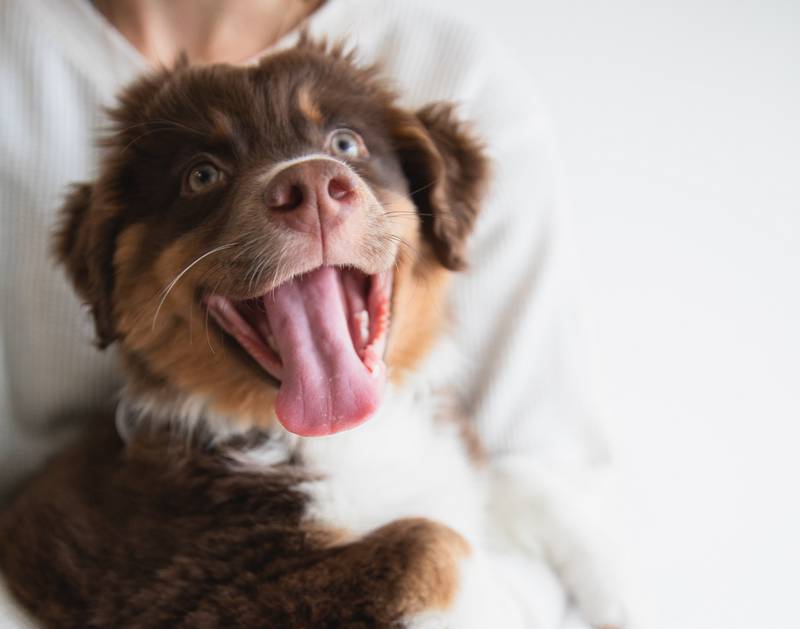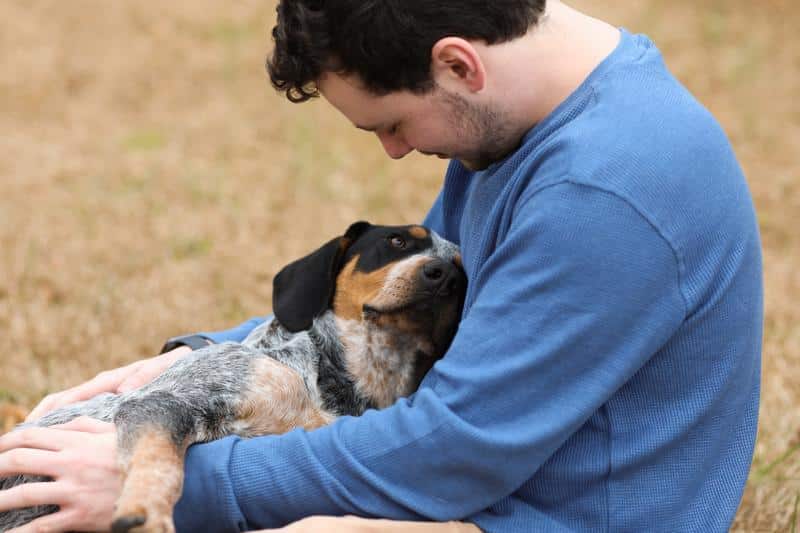My Dog Won’t Leave Me Alone! Am I Dying, Pregnant, or Sick?
It’s sweet when your furry friend follows you around, showing their loyalty and affection. But what happens when your dog won’t leave you alone? It can be a sign of a variety of things, from a behavioral issue to an intuitive reaction to changes in your physical or emotional state.
In this article, we’ll look at how to gently encourage your dog to give you some space, and we’ll investigate the reasons why your dog might be glued to your side. For example, can they sense if you’re pregnant, ill, or even facing a more serious health issue? What if it happens all of a sudden or during the night? We’ll explore all these scenarios and more below, so keep reading!
How to Get My Dog to Leave Me Alone

Sometimes, you may need your dog to give you a little space. To get your dog to leave you alone, it can be helpful to understand their behavior and needs, and to establish some strategies that cater to these needs without sacrificing your own comfort and space. Here are a few steps you can take:
- Providing Exercise and Stimulation: Regular physical exercise and mental stimulation are vital for your dog’s well-being. Long walks, playtime with toys, or a game of fetch can help burn off their excess energy, making them more likely to relax when back at home.
- Training ‘Go to Your Spot’ Command: Teach your dog a specific command, like “go to your bed,” or “go to your spot.” This requires patience and consistency but can be very effective. Remember to reward your dog when they obey the command.
- Setting Boundaries: It’s important to establish boundaries in your home. You might want to use baby gates to keep your dog out of certain areas or set rules about not jumping on the couch or bed.
- Using Puzzle Toys: Puzzle toys that can be filled with treats or dog food are excellent tools for keeping your dog occupied while giving you some personal space.
These steps will get your dog to leave you alone, but it’s important to remember that the underlying behavioral issue (separation anxiety) that was causing all of this to begin with will still be present. And until you address that, any positive changes you see are only going to be temporary.
“Well, how do I make these changes stick?”
By getting your dog to truly choose to follow your direction, that’s how. I tried many times to write out how you can do that before deciding it made more sense to just link you to the free video series that explains it better than I’d ever be able to.
The series is by a man named Dan who is one of the world’s leading dog obedience trainers. In it, he teaches you how to put an end to things like when your dog won’t leave you alone and all other misbehavior using his fast and easy-to-follow methods.
In the first video, Dan will reveal to you why the two most common methods of dog training only doom you to failure. You can watch the video now by clicking here. Follow the proven system he’ll show you in his series and you’ll never have to spend another second worrying about your dog not leaving you alone ever again!
Why Won’t My Dog Leave Me Alone?

You might be asking, “Why won’t my dog leave me alone?” It’s common to enjoy the companionship of your furry friend, but constant attention-seeking can become a bit overwhelming. Here are a few reasons why your dog might be exhibiting this behavior.
Separation Anxiety
Your dog could be suffering from separation anxiety. Dogs with this condition can become extremely anxious and stressed when left alone or separated from their owners. If your dog follows you everywhere and seems distressed when you’re out of sight, separation anxiety could be the cause.
Boredom or Lack of Stimulation
Dogs need physical and mental stimulation. If they’re bored or not getting enough exercise, they may turn to you for entertainment. Engaging in regular exercise and playtime can help ensure your dog is adequately stimulated and less likely to seek constant attention.
Learned Behavior
If you consistently respond to your dog’s attention-seeking behavior, they learn that this is a successful strategy to get your attention. This can encourage them to continue the behavior, creating a cycle of constant attention-seeking.
Health Issues
Finally, if your dog’s clinginess is a new behavior, it might be worth considering a health issue. Dogs often seek comfort from their owners when they’re feeling unwell or in pain. If your dog suddenly won’t leave your side, a vet check-up might be in order.
Remember, all dogs are unique, and their behaviors can be influenced by a variety of factors. Learn more about how to handle this issue by going back to the first section of this article.
My Dog Won’t Leave Me Alone, Am I Dying?
While it’s true that dogs have a remarkable sense of smell and intuition, a dog that won’t leave you alone is not a definitive sign that you’re ill or dying. Dogs can become clingy or overly attentive for numerous reasons, many of which are quite routine.
Here’s a look at some common reasons your dog might not leave you alone:
- Boredom: If your dog isn’t getting enough mental or physical stimulation, they might stick close to you in hopes of engagement or play.
- Anxiety: Dogs with separation anxiety or general anxiety may become very clingy. Their anxiety can cause them to follow you around constantly.
- Changes in the environment: Changes at home or in your routine could lead to increased clinginess as your dog seeks reassurance.
- You’re rewarding the behavior: If you pet, cuddle, or otherwise reward your dog every time they stick close to you, they’ll naturally want to continue the behavior.
That said, if your dog’s behavior changes suddenly or they’re showing signs of distress or anxiety, you should begin working to address the root cause. Go back to the first section of this article now and we’ll explain how you can do that.
If you have health concerns about yourself, it’s best to reach out to a healthcare professional. Dogs are intuitive, but they’re not an infallible diagnostic tool for human health.
My Dog Won’t Leave Me Alone, Am I Pregnant?
Some people believe that dogs have a sixth sense and can detect changes in their human’s body, including pregnancy. It is true that dogs are perceptive creatures, and they can pick up on subtle shifts in smell, mood, and behavior, which might be linked to pregnancy. However, a dog being clingy or not leaving you alone is not a definitive sign that you are pregnant.
It could be due to a multitude of reasons such as:
- Changes in Your Behavior: Dogs are highly perceptive and can sense changes in your mood, routine, or behavior. If you are behaving differently due to suspected pregnancy, your dog might be reacting to that.
- Your Scent: Dogs have a highly developed sense of smell and can detect subtle changes in your body’s scent. Hormonal changes associated with pregnancy might be perceptible to your dog.
- Increased Attention: If you suspect you’re pregnant and are giving your dog more attention as a result, they might become clingier simply because they enjoy it.
However, if you suspect you’re pregnant, the best course of action is to take a pregnancy test or consult with a healthcare provider. While dogs are intuitive creatures, they can’t replace medical advice and scientific testing. But to learn how to handle a dog who’s just too clingy, go back to the first section of this article now.
Why Won’t My Dog Leave Me Alone All of a Sudden?
If your dog won’t leave you alone all of a sudden, it can be quite concerning. However, several reasons could be behind this behavioral change. Understanding these can help you address the issue more effectively:
- Physical Discomfort: If your dog is in pain or discomfort, they might seek out your company more than usual. This could be due to an injury, illness, or general discomfort.
- Anxiety or Stress: Changes in your dog’s environment, such as moving to a new home, introducing a new family member, or meeting a stranger, can cause them to feel anxious or stressed. In such cases, they might stick to you more closely for comfort and security.
- Boredom: Dogs need physical and mental stimulation. If they’re bored, they might seek out your company as a source of entertainment. Ensure your dog has enough toys and activities to keep them occupied.
- Aging: Older dogs may become more attached or needy due to changes in their mental state. Canine cognitive dysfunction, similar to Alzheimer’s in humans, could be a cause.
Remember, if your dog’s clinginess is accompanied by other worrying symptoms, such as changes in appetite, lethargy, or behavioral changes, it’s best to consult with a vet. They can help determine if there’s an underlying health issue that needs addressing.
My Puppy Won’t Leave Me Alone
If you’re thinking, “My puppy won’t leave me alone,” rest assured that this is a common issue many new puppy owners face. Puppies are energetic, curious, and have a strong desire for companionship. Let’s explore why your puppy might be sticking to you like glue.
Need for Social Interaction
Puppies are social creatures. They crave interaction and companionship, which are critical for their mental well-being and development. If you have a puppy following you around constantly, it might be seeking social interaction and stimulation.
Learning About Their Environment
As young animals, puppies are curious and eager to explore their environment. This includes the people in it! By sticking close to you, they’re learning about human behavior and picking up on how they should respond to their environment.
Separation Anxiety
Like older dogs, puppies can also experience separation anxiety. If they’re left alone, they can become anxious and stressed, which often leads them to seek comfort by staying close to their owners.
Looking for Guidance
Puppies look to their human caregivers for guidance. They’re still learning about the world and need reassurance that they’re safe. By sticking close to you, your puppy may be looking to you for cues on how to behave and respond to their surroundings.
While it’s normal for your puppy to want to be around you, it’s also important to start teaching them independence and confidence. If you’re concerned that your puppy’s clinginess might be indicative of a more serious issue, or if it’s interfering with their ability to learn independence, go back to the first section of this article where we’ll teach you how to help.
Dog Won’t Leave Me Alone at Night
If your dog won’t leave you alone at night, it can disrupt your sleep and create stress. Several factors might be contributing to this issue:
- Inconsistent Sleep Schedule: Dogs, like humans, benefit from a regular sleep schedule. If your dog’s sleep routine has recently changed, they may have difficulty adjusting and may try to engage with you during their awake hours.
- Fear or Anxiety: Some dogs develop nighttime anxiety, which can be triggered by a variety of factors such as fear of the dark, loud noises outside, or being alone. If this is the case, they may seek comfort and safety by staying close to you.
- Boredom or Lack of Exercise: If your dog is not getting enough physical or mental stimulation during the day, they might be too energetic at night. Making sure your dog has enough exercise and mental stimulation during the day can help them sleep better at night.
- Health Issues: Certain health problems can cause discomfort or pain that might keep your dog awake at night. If your dog’s nighttime clinginess is accompanied by other concerning symptoms, it might be a good idea to consult with a vet.
It’s important to try and understand the cause of your dog’s nighttime clinginess in order to address it effectively. Implementing a consistent nighttime routine, ensuring your dog has plenty of exercise during the day, and addressing any potential sources of anxiety can help your dog feel more comfortable at night. Go back to the first section of this article to learn how.
My Dog Won’t Leave Me Alone, Am I Sick?
Dogs are known for their heightened senses and intuition, and there are indeed stories of dogs seemingly sensing their owners’ illnesses before they’re diagnosed. However, if your dog won’t leave you alone, it doesn’t necessarily mean you’re sick. Dogs can become clingy or overly attentive for various reasons.
Here’s a look at a few possible explanations:
- Seeking attention: Your dog may simply want attention, play, or interaction. They might stick close to you if they’re bored or craving engagement.
- Anxiety: Dogs with separation anxiety or general anxiety can become very clingy. Changes in routine or environment can also trigger this behavior.
- Training and reinforcement: If you respond to your dog’s clinginess with petting, treats, or other positive reinforcements, they might stick close to you more often.
- Sensing emotional changes: Dogs are sensitive to their owners’ emotions. If you’re feeling stressed, upset, or anxious, your dog might stick closer to you in response.
If you’re concerned about your health, it’s best to consult with a healthcare professional. While dogs are intuitive, they’re not a reliable source for diagnosing human health conditions. If your dog’s behavior has changed dramatically or they seem distressed, it’s also worth reaching out to a vet.
I’m sure your ready to give your dog confidence and independence, so I’ll let you get started on things now. Best wishes with everything, and thanks for reading our article “My Dog Won’t Leave Me Alone! Am I Dying, Pregnant, or Sick?”





